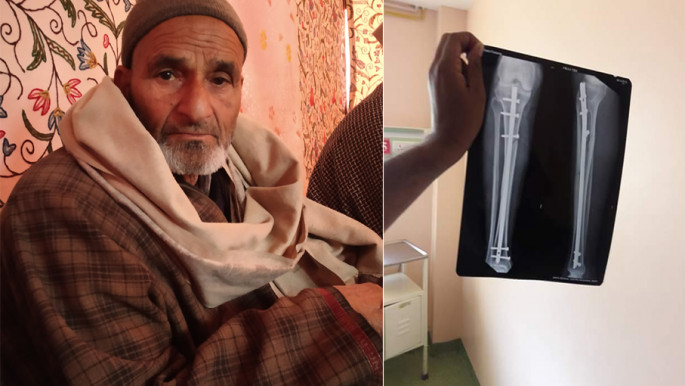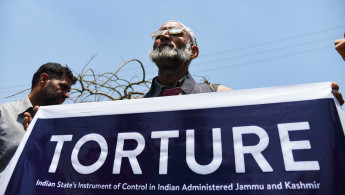Gory tales of torture in Indian-administered Kashmir
On March 19, 2019, Mohammad Asadullah Pandith, received a dead body of his 28-year-old son, Rizwan Asad Pandith, a school principal by profession, from police in Indian-administered Kashmir.
Just two days before he was allegedly killed in the custody, Rizwan, a resident of South Kashmir's Pulwama district, was picked up by police from his residence and was shifted to Cargo, a notorious detention centre located in Srinagar, the summer capital of Indian-administered Kashmir.
According to his family, Rizwan was tortured to death in the custody. Even the preliminary post-mortem report discovered that "excessive bleeding caused by deep wounds on Rizwan's body" could have resulted in death.
Without citing the reason for the death, police in an initial statement said Rizwan was picked up by them "in connection with a terror-related case and he died in the custody".
Police lodged a First Information Report (FIR) against Rizwan, two days after his death, accusing him of attempting to escape from custody while travelling to South Kashmir for searches.
After the news of Rizwan's custodial death spread, protests erupted in some areas of Indian-administered Kashmir. Hundreds of people poured out onto the streets and pelted stones on security forces.
 |
By not giving justice to victim's families... the government is encouraging the security forces to continue such crimes |  |
The situation forced the administration to constitute the special investigation team to inquire into the alleged custodial killing of Rizwan, giving a hope to victim's family that a credible and transparent investigation would be conducted in the incident.
One month after Rizwan custodial death, the family had still not processed the loss of their beloved son. Their hope for justice had diminished as there had not been any development in the case.
Rizwan's younger brother, Zulkarnain Banday, showed a photograph of his slain sibling, taken a few months back. He poses glowing with grace displaying his youth in full bloom.
Before displaying another photograph of Rizwan, taken before he was buried, Zulkaranain said, "See! How they have tortured my brother till he died." In the picture, torture marks on Rizwan's body were visible.
Asadullah, a soft-spoken father of Rizwan, clad in a Pheran (a long loose cloak worn by men and women in Kashmir during winter), was leaning against the wall. Referring to previous similar cases in Kashmir, Asadullah said that the government had failed delivered justice in such cases, where the criminal was their own security personnel.
"By not giving justice to victim's families," heart-broken Asadullah continued, "the government is encouraging the security forces to continue such crimes."
Almost three months have passed justice still eludes Rizwan's family. It seems that investigation is following the same pattern as the other such similar cases over the past three decades – probe leads nowhere and the family awaits justice.
 |
|
| Abdul Khaliq Wagay, 70, is now crippled for life after security forces allegedly beat his legs during a search operation in Southern Kashmir's Pulwama district [Aamir Ali Bhat] |
In May, this year, a comprehensive 550-page detailed report of such torture tales was released by two Kashmir-based organisations – Association of Parents of Disappeared Persons (APDP) and the Jammu Kashmir Coalition of Civil Society (JKCCS).
The report titled Torture: Indian State's Instrument of Control in Indian Administered Jammu and Kashmir has document 432 case studies of torture perpetrated by the Indian state in Indian-administrated Kashmir since 1990. The reports figured out the trends and patterns, targets, perpetrators, contexts and impact of torture.
According to the report, 326 people have been subjected to beating as a form of torture, followed by electrocution (231), stripping prisoners naked (190), rolling a heavy log on detainees legs (169), electrocution in genitals (127), hanging upside down (121), stress position/tying hands (105), head dunking in water mixed with chili (101) and so on.
Among the other patterns of torture include sleep deprivation, burning of the body with hot objects, solitary confinement, verbal abuse, inserting objects into the rectum and sexual torture including rape and sodomy.
Out of 432 cases studied, 301 were civilians including minors and women, 119 were armed rebels, five ex-militants (essentially civilians at the time of being tortured), two from the police and affiliations were unverified in five cases. At least 40 people died as a result of injuries received during torture.
"While Joint Interrogation Centres (JICs) were constructed primarily to execute torture in and around Kashmir valley," the report says, "the gruesome practice wasn't limited to these centres. Police stations, military camps, SOG camps and even abandoned buildings were also used for this purpose. During Cordon and Search Operations (CASOs), the government buildings in a particular area, like schools, Primary Health Centres, Rural Development Offices etc., and sometimes even the houses of local people, would be turned into makeshift torture centres."
Calling the report as a landmark in his prologue to the report, Juan Mendez, a former UN Special Rapporteur on Torture said the report will draw international attention to India's human rights violations in Indian-administered Kashmir.
In one of the cases documented in the report, the victim named Qalandar Khatana was subjected to torture by paramilitary soldiers in 1992, accusing him of being a "guide" for local armed rebels crossing over the border to Pakistan for arms training.
"His flesh was cut from buttocks and he was made to eat it. His legs were broken, and he was not given any medical assistance," the report said. "He was shifted from Srinagar to Kot Bhalwal Jail, Jammu in this condition. While in jail, his wounds got infected with maggots and both his legs had to be amputated."
Besides Khatana, his wife was also tortured by Indian troops, leaving her ribs broken and she succumbed to injuries a few years later.
 |
His flesh was cut from buttocks and he was made to eat it. His legs were broken, and he was not given any medical assistance |  |
On July 8, the office of the United Nations High Commissioner for Human Rights (OHCHR) released a second report, accusing Indian of human rights violations in Kashmir. The UN rights office said in a 43-page report that both India and Pakistan have failed to improve the situation in Kashmir and called for the formation of a commission of inquiry into the allegations of human rights abuses in the disputed territory.
Rejecting the report, India said it is merely a continuation of the earlier "false and motivated" narrative.
In June, last year, the Office of OHCHR released its first-ever report on human rights violation in both sides of Kashmir.
The report stated there is an urgent need to address past and ongoing human rights violations and abuses and deliver justice for all people in Kashmir, who for seven decades have suffered a conflict that has claimed or ruined numerous lives.
Pakistan welcomed the report, while the Indian government rejected it called it "fallacious and motivated".
AFSPA: A Legal Protection
When India was under the British rule, the Armed Forces Special Powers Act (AFSPA) was enacted in 1942 under Lord Linlithgow ordinance to suppress the Quit India movement. After gaining independence in 1947, India passed the same the law to bring under control what the government of India considered 'disturbed' areas.
The law was applied to Indian-administered Kashmir in 1990 and provides a legal cover to the Indian soldiers for any acts committed in the line of duty. The controversial act has drawn strong flak from human rights groups including the United Nations Human Rights Council as it gave sweeping immunity to the Indian troops in Indian-administered Kashmir.
Under AFSPA Indian soldiers can't be tried in civilian's courts. Although, Indian claims it punishes its soldiers in military courts, but not a single Indian soldier has been jailed for human rights violations in Indian-administered Kashmir.
In April, while giving an interview to Network18 Prime Minister Narendra Modi dismissed any talk of repealing the AFSPA in Kashmir. He said the removal of AFSPA from the Valley is like "sending our soldiers to the gallows."
However, in his prologue Mendez reiterated that, "Impunity for the acts of torture that are well documented, even by state agencies and courts, is undoubtedly the principal factor in the recurrence of the practice.
"But when impunity is the almost universal outcome of every first investigatory step, and when that outcome is repeated over hundreds of cases, no matter how well documented, then impunity is not a weakness of the State: it is the public policy of the State. And if impunity for torture is policy, the inevitable conclusion is that torture is policy as well."
In the absence of any law criminalising torture and the absolute impunity that the Indian armed forces enjoy, the report said, torture continues unabated in Indian-administered Kashmir.
Aamir Ali Bhat is a Kashmir-based freelance journalist who reports on human rights abuses, culture and the environment. He writes for The New Arab, Kashmir Ink and Free Press Kashmir.
Follow him on Twitter: @Aamirbhatt3



